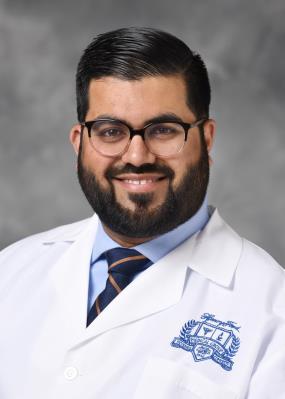Lifesaving Heart Attack Treatment Replicated Nationally

FOR IMMEDIATE RELEASE
Groundbreaking Study Initiated at Henry Ford Health System Show Increased Survival
LAS VEGAS – Patients with a deadly heart attack complication nationally survived at significantly higher rates when treated with a specific protocol created by cardiologists at Henry Ford Health System, according to trial results announced today.
Henry Ford Hospital was one of 65 sites enrolled in the National Cardiogenic Shock Initiative (NationalCSI) study that showed 72% of patients with cardiogenic shock survived their heart attack when treated with the protocol.
Researchers announced the trial results today at the Society for Cardiovascular Angiography and Interventions (SCAI) 2019 Scientific Sessions. Typical survival rate from this deadly complication has historically hovered around 50%.
“Henry Ford Health System is pleased to help move the needle in survival from heart attacks,” said Henry Ford cardiologist Mir "Babar" Basir, the study’s lead investigator, who presented the results. “We’ve worked together as a team to create, implement and share this protocol, and we’re happy to see the results in patients. Even though every hospital has their own standards, we found that when physicians across the country recognize the signs of shock early and follow this protocol, it can save lives.”
In heart attack patients experiencing cardiogenic shock, the heart is too weak to pump blood to vital organs and the rest of the body. The scenario deprives vital organs of sufficient blood supply, causing them to go into shock and, eventually, cease functioning.
The protocol, available at henryford.com/cardiogenicshock, entails quickly recognizing the condition, then inserting a straw-sized pump into the heart to keep blood flowing throughout the body. The Impella pump, an FDA-approved device, is inserted through a catheter in the groin as soon as the patient arrives at the hospital. Doctors then treat the cause of the heart attack, either inserting a stent, removing a clot or taking other necessary action.
National study results released today involved doctors across the country at sites ranging from community hospitals to large academic centers. They used the protocol to treat 171 patients -- 77% male with an average age of 63 years - between July 2016 and February 2019. They also isolated predictive markers that indicate a patient’s condition, an invaluable tool in determining treatment.
NationalCSI researchers and cardiologists based at Henry Ford Hospital in Detroit are leading the study, the first large-scale clinical trial of a national cardiogenic shock treatment protocol. It is the second iteration of a smaller pilot study conducted in southeast Michigan and is expected to continue at (your hospital) and other locations for at least two more years.
“We’re very pleased that these preliminary trial results show this protocol can be replicated in many different hospital settings to improve survival in cardiogenic shock,” said Henry Ford Health System pioneering cardiologist William W. O’Neill, medical director of the Henry Ford Health System Center for Structural Heart Disease. He said he expects continued improvements could raise the survival rate to >80%.
MEDIA CONTACT: Tammy Battaglia / Tammy.Battaglia@hfhs.org / 248-881-0809
.svg?iar=0&hash=F6049510E33E4E6D8196C26CCC0A64A4)

/hfh-logo-main--white.svg?iar=0&hash=ED491CBFADFB7670FAE94559C98D7798)









